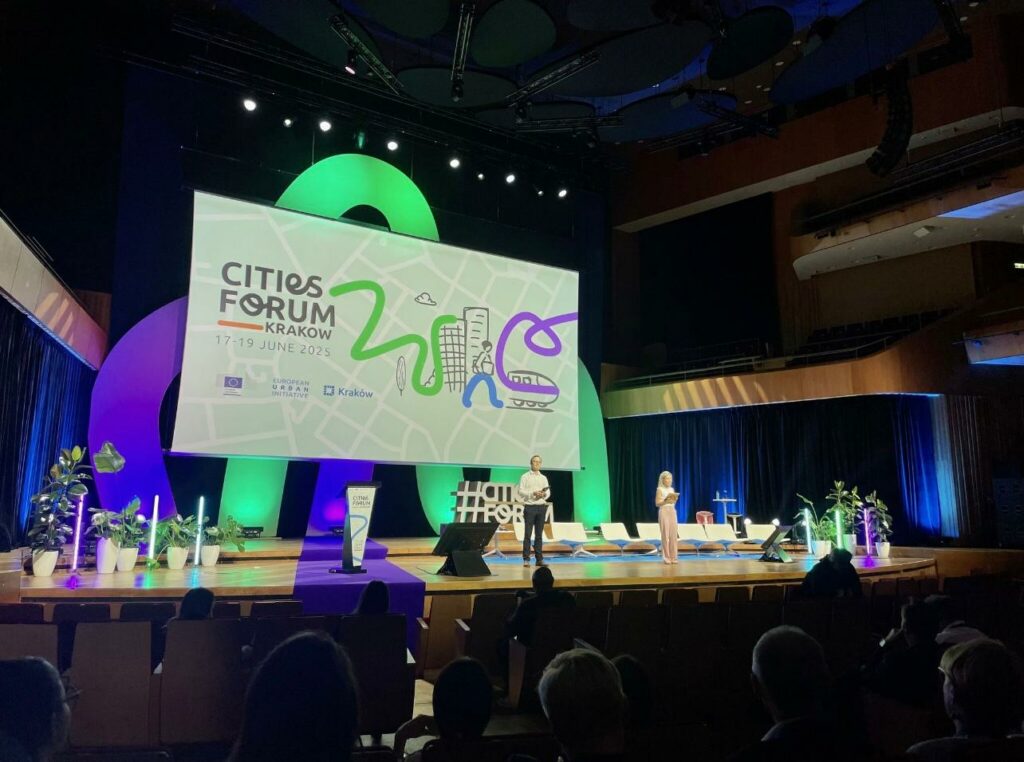
From 17 to 19 June 2025, the city of Krakow hosted the Cities Forum 2025, a flagship event of the EU’s urban policy. Held in a hybrid format, the forum brought together policymakers, urban experts, researchers, and citizens to shape a shared vision for sustainable, inclusive, and innovative cities. Throughout the event, city centers emerged as central to the discussions on Europe’s urban future.
City Centers: Drivers of Urban Transformation
Discussions throughout the forum highlighted how European city centers are key engines of change. As spaces of culture, innovation, and daily life, they concentrate both challenges and potential:
- The session “Cities as enablers of innovation” showcased how urban cores are leading transitions in digitalization, civic participation, and the use of shared urban spaces.
- Best practices from across Europe showed how investments in public space, sustainable mobility, and cultural life can boost city center attractiveness while promoting climate goals.
- The issue of affordable housing —particularly in central areas—was discussed, notably during an interview with MEP Marcos Ros Sempere, a strong advocate for urban housing rights.
What Do Citizens Think?
The latest Eurobarometer survey, presented at the start of the forum, revealed growing public support for a stronger and more engaged EU in urban matters:
- 75% of citizens feel European, and 52% trust the EU, the highest level since 2007.
- 43% say EU investment should focus on education, housing, employment, and healthcare — all issues closely tied to city centers.
- Citizens also expressed strong support for more action on urban mobility, green energy, and public space revitalization.
Rethinking Public Space and Urban Design
Sessions such as “Driving change for urban mobility” and “Climate change mitigation: get inspired by European cities” spotlighted real-world examples of cities transforming their centers:
- Cities are pedestrianizing central areas, introducing green corridors, and limiting car traffic, creating more livable and climate-resilient environments.
- Cities like Ghent, Coimbra, and Rzeszów shared how they are reviving their urban cores through cultural programming, youth engagement, and sustainable economic development.
A People-Centered Urban Agenda
Looking toward 2030, the Urban Agenda for the EU emphasizes a local and integrated approach to urban development. City centers are not just places of commerce—they are spaces of memory, identity, and shared life. The Cities Forum stressed the need to:
- strengthen local authorities’ capacities with tailored funding tools,
- encourage transnational cooperation among medium-sized cities,
- and support cultural and heritage-based projects that resonate with local communities.
The Cities Forum 2025 clearly demonstrated that city centers are key to tackling Europe’s major challenges — from climate action to social inclusion and economic recovery. In a context of renewed citizen trust in the EU, urban policies must now translate into tangible, visible, and shared projects in the heart of our cities.
More Informtion

